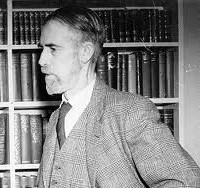Christopher Dawson: The Twofold Nature of Christian History, by Gerald J. Russello
Christopher Dawson wrote with two different audiences in mind. He sought both to displace the bankrupt Victorian and Edwardian liberalism of his own day and to shake the complacency of his coreligionists who preferred to bask in the quickly fading light of false medievalism. His carefully crafted prose revealed a nuanced and original understanding of Western history.
To combat “scientific” theories of progress, Dawson argued that every civilization relies on those who most fully represent its ideals and shape the culture through their actions. Dawson maintained that “history is at once aristocratic and revolutionary. It allows the whole world situation to be suddenly transformed by the action of a single individual.” It is this dynamic historical process that is fatal to a secular understanding of religious approaches to history. In the words of Edmund Burke that Dawson quoted with approval, at times a “common soldier, a child, a girl at the door of an inn have changed the face of the future and almost of Nature.” To the Christian, this understanding of historical development permits interpretation of past events in the light of divine will and spiritual forces that may be unknown even to the actors themselves.
Dawson set out for himself the task of explaining the twofold nature of Christian history: while the Christian faith embodies eternal values and the teachings of God, it nevertheless transforms utterly the cultures it contacts. When the Christian faith enters into a culture, as when it first burst upon an overcivilized and jaded Rome, it begins a spiritual regeneration that affects not only the material, external culture, but the interior constitution of its members. In an essay entitled “The Christian View of History,” Dawson wrote:
For the Christian doctrine of the Incarnation is not simply a theophany—a revelation of God to Man; it is a new creation—the introduction of a new spiritual principle which gradually leavens and transforms human nature into something new. The history of the human race hinges on this unique divine event which gives meaning to the whole historical process.
This new, world-transforming history overthrows its rivals, whether the Greek idea of an endless series of repeating cycles or the spiritless homogeneity of the “postmodern” era. The Incarnation gives shape to history and supplies a beginning, a middle, and an end: “the Christian view of history is a vision of history sub specie aeternitatis, an interpretation of time in terms of eternity and of human events in the light of divine revelation.” This concentration on the physical substance of the Christian faith was a conscious counterweight to overly aesthetic theories of Christianity, such as the “super-Christianity” of Matthew Arnold, for example, which reduced the force of religious belief to a set of humanistic nostrums.
The figures whom Dawson chose to study highlight his interest in the transformative power of the Christian faith: St. Augustine, who formed Christian thought out of the ruins of the old world order; St. Thomas Aquinas, whose reception of the Greek-Arabic body of scientific knowledge created a new movement in Western thinking without compromising its integrity; and St. Ignatius Loyola, who inaugurated a new spirituality to confront the challenges of the Reformation. Dawson saw the present age as one similar to that of Augustine or Ignatius, and in need of saints who have the vision to lead the faithful into the next era. The Western world, he thought, was facing another of its “cultural discontinuities” that displace the old order and usher in a new social reality. The question that remained, for Dawson as for Eliot, was whether this new era was to be Christian or a “new civilization which recognizes neither moral laws nor human rights.”
Dawson wished first to reassert the importance of a millennium of Christian belief to modern history. It is not necessary to be a Christian to recognize that Christianity has played a profound role in shaping European culture and that “there is no aspect of European life which has not been profoundly affected” by that faith. Dawson sought to counter the skeptics of his day who saw in Christianity at best a series of moral tales (and at worst mere pretexts) that had no lasting influence on Western social practice or political arrangements. This aspect of his writings won him many admirers, including T. S. Eliot and Arnold Toynbee.
Read the complete article in The Imaginative Conservative
